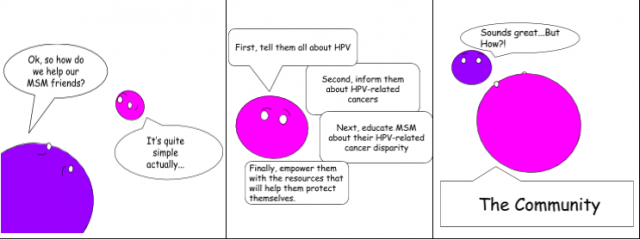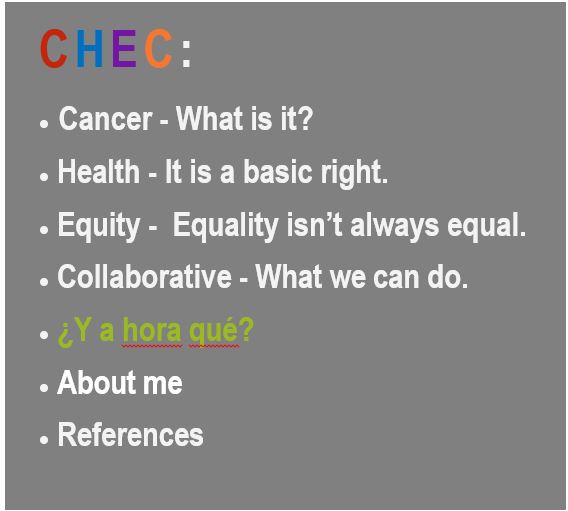HPV-Related Cancer and MSM: Can community intervention reduce incidence?
My collaborative research efforts this summer taught me that social determinants play a huge role in the quality of healthcare that an individual receives. A person’s neighborhood,income, education, skin color and even sexual orientation determines the type of medical attention that person can access. Social determinants also influence which people have a higher probability of contracting certain illnesses. If a person happens to have the “wrong”skin color or the “wrong” income, he or she has a higher probability of having limited access to resources that are readily available to those with all the “right” social attributes. This situation is the definition of a disparity.
According to the CDC, the top candidate for HPV-related cancer is the MSM community.

The leading cause of all HPV-related cancers is, of course, HPV. So what is it and why is the MSM population so vulnerable?
● HPV, also known as human papillomavirus, describes a group of over 150 viruses. With over 14 million new infections each year, HPV is the most common sexually transmitted infection (STI) in the United States. Most of the HPV related incidences of cancer are caused by high-risk viruses type 16 and type 18.(1)
● HPV high-risk viruses are reported to be responsible for 2% of new cancer cases, which is over 30,000 incidences. The majority of these incidences will be MSM. (1)
● According to the CDC, HPV incidence rates are increasing in MSM compared to other cohorts, such as heterosexual men and women. (4)
● Research also reveals that although a significant portion of the MSM population has heard of HPV (74%), less than half know that the STI causes health problems for males and even fewer had knowledge about associated illnesses such as cancer. (3)
● A significant portion of the MSM population has HIV, which weakens the immune system. (1)

There is strong indication that education is the biggest gap that creates the disparity for the MSM community. After being educated about HPV-related cancers, the following was said by members of the MSM community:
“I had no idea that it caused all of those cancers. I think if that was made public knowledge [people would get vaccinated]”
“knowing the facts is the most important part because once you know then you realize this shouldn’t be disregarded and there’s a vaccine you should probably get”.(2)
In order effectively reach the greatest number of people we have to work with community organizations. The MSM community prefers organizations that welcome and support their sense of identity. Places that already have an established relationship with MSM are the best places to implement an education program because they already know the population and how to best relay the necessary information. The MSM will also have the opportunity to come back to get more information if necessary. If this population can be empowered with knowledge, they will have the ability to make sure they can approach their healthcare provider to ask for the necessary preventive care.
Conclusion
There’s an old saying, “If you know better, you do better.” Information has to be given to as many people as possible in language that is easily understood by the people. As more community organizations begin to gain reputations as health literacy hubs, I believe that the MSM HPV-related cancer disparity will start to disappear.
References:
1. Centers for Disease Control and Prevention. (2017, April 26). Retrieved from https://www.cdc.gov/
2. Fontenot, H. B., Fantasia, H. C., & Zimet, G. D. (2017). Increasing HPV Vaccination and Eliminating Barriers: Recommendations From Young Men Who Have Sex With Men. Journal of Adolescent Health, 60(2). doi:10.1016/j.jadohealth.2016.10.424
3. Koskan, A. M., & Fernández-Pineda, M. (2018). Human Papillomavirus Vaccine Awareness Among HIV-Positive Gay and Bisexual Men: A Qualitative Study. LGBT Health, 5(2), 145-149. doi:10.1089/lgbt.2017.0109
4. Welbeck, M. (2016). Anal Pap Screening for HIV-infected Men Who Have Sex With Men: Practice Improvement. Journal of the Association of Nurses in AIDS Care, 27(1), 89-97. doi:10.1016/j.jana.2015.08.008
Disclaimer
The views expressed in this paper are exclusively those of the author and not necessarily representative of the organizations the author represents nor the ChicagoCHEC organization. This work is solely intended to help further disseminate information related to ChicagoCHEC’s cause and stimulate dialogue about important topics. It is not a report by ChicagoCHEC itself and must not be treated as such.



